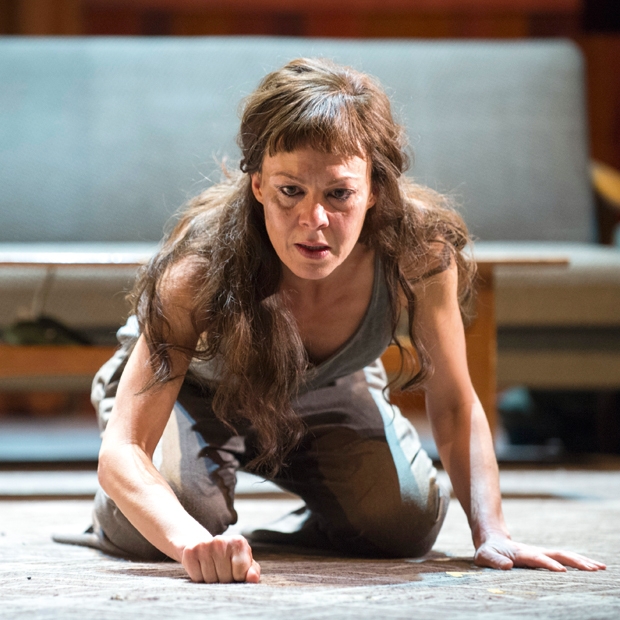Carrie Cracknell’s new version of Medea strikes with overwhelming and rather puzzling force. The royal palace has been done up to resemble a clapped-out Spanish villa that seems to date from about 1983 if the kennel-sized TV set is anything to go by. (Weren’t TVs massive then? And always brown.) The villa’s peeling wallpaper and suppurating marble edifices form a balcony that straddles an eerie little copse, which manages to look both indoors and outdoors at once. These warring effects — villa and forest — do little to elucidate the play’s simple story: jilted Medea avenges herself on love rat Jason by murdering their two sons and bumping off his new sex-bunny. Helen McCrory’s Medea is terribly, terribly English while Jason is played by a black Briton, Danny Sapani. Odd that. Euripides had it the other way around. Jason, a local prince. Medea, a blow-in from the Black Sea or, in today’s parlance, a Romanian.

Despite these muddles and own goals, the show is gripping throughout and never becomes earnest, obscure or boring, which, let’s face it, Greek tragedy can often be. Ben Power’s sinewy script carries suggestive echoes of Hamlet and Macbeth. McCrory (always at her best in frothy comedies) gives a riveting account of the beautiful and demented sorceress. Her final speeches, where she whips herself into a killing frenzy, are as absorbing and scary as anything in Shakespeare. The chorus is played by a dozen bridesmaids in weird robes of pink and black, a nicely disturbing combination. But I wasn’t convinced by their zombie jerk-dances lifted from the Thriller video.
Other touches are more baffling. Medea assassinates Jason’s wife by giving her a dress whose booby-trapped threads are laced with poison. It’s a tough job for Clemmie Sveaas, as Kreusa, to don the toxic frock and then mime her agonised death throes while doing a funky striptease routine under a spotlight. It looks a bit Turner Prize. And the final moments are bathetic. The bloodstained murderess drags her slain progeny, emparcelled in two ketchupy sleeping bags, to the centre of the stage. She then hoiks them on to her shoulders and ambles off through the forest like a bin collector transposed into a Teutonic fairy tale. Unsupported by rhetoric, this wordless tableau looks banal.
And so to festivals. Are you a fan? I can think of lovelier fates than spending a weekend in a Home Counties refugee camp populated by 100,000 spaced-out nomads watching a bewigged great-grandfather paying off his alimony bill. But for some people, it’s heaven. Many festivals now offer theatre as a novelty, and writers have responded by creating shows that meet the specific needs of festival flockers. These plays are light, racy urban comedies with a small cast and a single set.

The Arcola theatre has erected a tent for Tom Basden’s offering, Holes, which gives punters a chance to experience festival drama while staying in touch with civilisation (well, Dalston). The storyline is topical. Too topical. A plane bound from Europe to Australia crash-lands on a remote island in south-east Asia. Three marketing consultants and a sexy teenage girl are the only survivors. Events in Ukraine make this story feel right up to date and it’s odd that Basden didn’t add a line or two to put his characters on the same level of awareness as his audience.
Basden’s dialogue is very funny, subtle and enjoyable and the play develops into a flatshare sitcom with the characters competing for booze, sex and airline food. He expertly orchestrates the comic contrasts between their fatuous expectations and their perilous new reality. Then he blunders badly. He adds a nuclear cataclysm that engulfs the globe and renders his characters the last earthlings alive. This is complicated, superfluous and, I’m afraid, entirely unconvincing. A computer geek gets a clear line to London just as the first nuclear bomb falls. The line goes dead. From this he deduces that seven billion people have died? Hardly.
The star of the show is Daniel Rigby (the chubby student from the annoying BT ads) who does brilliant work as an office pedant who turns into a deranged tyrant. Elizabeth Berrington delivers pure comedy gold as a dimwitted nympho desperate to bed one of her fellow castaways. She gets bumped off far too early and the play’s romantic interest shifts uncertainly to the threadbare Erin (Sharon Singh), whose role as a bangable love-dolly is underwritten. Basden gives the script a commendably experimental ending. One character, caged underground, acts an entire scene with one upthrust hand gesturing from a fissure in the earth. An oblique homage to Samuel Beckett. Holes is a pretty good play, very finely acted. It could have been better. But given that it’s aimed at members of the lumpen trustafariat, high on MDMA, this may not matter.







Comments